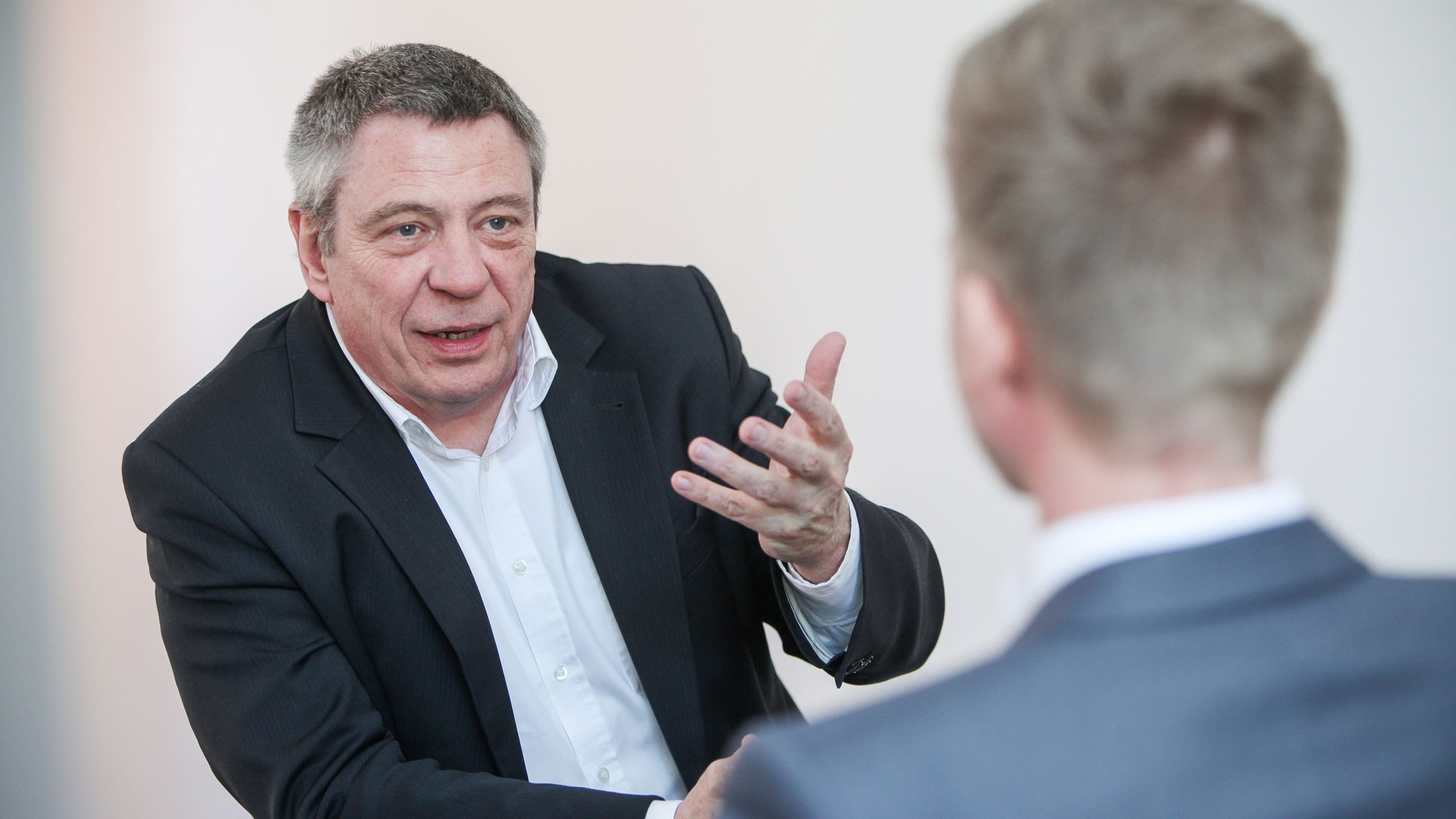
Interview

Digitalisation is a key topic in the textile and fashion industry. However, in particular for small and medium-sized enterprises this development is also associated with uncertainty and challenges. We spoke with Dr. Uwe Mazura, Director General of the Confederation of the German Textile and Fashion Industry (textil+mode) and Anja Merker, Managing Director of the Competence Centre Textil vernetzt, about information options and subsidies for SMEs.
Mr Mazura, you have been Director General of the Confederation textil+mode since 2014. Can you describe the tasks of the Confederation in more detail?
Being an employers and trade association, we represent the interests of about 1,400 mostly medium-sized enterprises with more than 135,000 employees. These enterprises generate an annual turnover of approximately 35 billion Euros in Germany. We are the umbrella organisation consisting of 11 regional and 14 trade associations of the textile and clothing industry as well as leather and footwear in Germany. In addition to dealing with collective bargaining policies, we are in touch with all relevant social and political representatives from our offices in Berlin and Brussels. Our aim is to make the portfolio of the German textile industry visible with all its diversity and innovative strength and to engage in all procedures that ensure the best possible location factors for the enterprises we represent.
What constitutes the diversity in the German textile industry?
Textiles from Germany are far more than just clothing. High-quality yarns, non-woven fabrics, tissues, fibres for lightweight textile construction, for automobile and aircraft construction, for medical products – from wound dressings to stents. The industry makes products for very specific applications, from filters for other industries to protective work clothing, such as fire safety. Just think of the many textiles we have at home, from carpets, curtains to towels and textiles for all kinds of furniture. There is hardly any area of life where we don’t find any textile applications. Thanks to the high density of training and research facilities in Germany, our companies succeeded in becoming competitive with smart and innovative products on an international level. As for the field of technical textiles, we are even world market leader. Textiles are forming the modern world, with an impact that reaches far into other sectors.
How do you think the future will look like, in particular in the fashion sector?
The major trends we see today are individualisation and digitalisation. 3D printing allows to produce clothing or shoes tailored to the customer’s individual needs. In the future, our clothing will become smarter and smarter, not only in the field of functional and sportswear. Smart textiles measure bodily functions; they keep warm or cool down as needed. In the fashion field, German brands are worldwide synonymous both for best quality and design and for excellent social and environmental standards. Thus, German companies are in an excellent position also in the fashion sector. No other business is as global as the textile business, so our clothing companies need to put in constant effort in order to withstand international competition.
Mrs Merker, you are Managing Director of Mittelstand 4.0 Competence Centre Textil vernetzt. Could you give us some more details about that?
The Centre was launched in November 2017 under the auspices of the Confederation of the German Textile and Fashion Industry (textil+mode) as part of the ‘Mittelstand-Digital’ initiative. With this initiative, the Federal Ministry for Economic Affairs and Energy promotes digitalisation in small and medium-sized enterprises and in the craft sector. This is also our mission to demonstrate to the textile mid-sized sector the opportunities of digital transformation and to give them practical instructions. Ideally, this means that we analyse existing potentials and implement customised solutions in close cooperation with these enterprises.
We are working closely with four partners in order to focus on consistent digital engineering, Industry 4.0, sensor technology and networked production.
The Confederation of the German Textile and Fashion Industry operates a showroom in Berlin. What can we see there?
The mid-sized sector cannot figure out very much with the term ‘digitalisation’ in practice. We therefore provide exhibits for hands-on experience in the field of digitalisation. We further demonstrate how digital transformation in the sector may look like. We are very delighted to see that the interest of SMEs is growing with each event that we arrange. In our showroom in Berlin, we demonstrate the areas where we provide specific support in cooperation with our four partners: Textile Technology Institute (ITA) in Aachen, the Saxony Textile Research Institute (STFI) in Chemnitz, the German Institute for Textile and Fibre Research (DITF) in Denkendorf and sensor manufacturer Hahn-Schickard in Stuttgart.
In which areas within a textile company does digitalisation take effect? And where do businesses need most support?
We provide support both for beginners and experts. Many medium-sized enterprises are particularly interested in upgrading their existing machines and equipment by integrating smart sensor technology. In businesses where we have performed a needs analysis, the portfolio ranges from the introduction of assistance systems to the use of robot technology. Our main focus is to enable employees to deal with digital applications. To achieve this, our network provides opportunities for hands-on training and further education.
What kind of funding opportunities can SME in Germany benefit from?
There are various funding programmes in Germany, offered for example by the KfW (Kreditanstalt für Wiederaufbau), by regional development banks or business development programmes. These range from consulting or innovation vouchers to digital loans.
Do you have any tips for medium-sized enterprises from the clothing industry?
None of us can ignore the topic of digitalisation. It is therefore advisable to deal with the challenges sooner or later and to seek assistance. No one needs to become a ‘digital native’ – for this, there are networks of experts such as ours – but every entrepreneur should have a clear idea of where their company is heading in the coming years.
Optimising business processes and introducing new technologies is possible. All we need is a meaningful strategy and appropriate expertise. We can offer both of these.